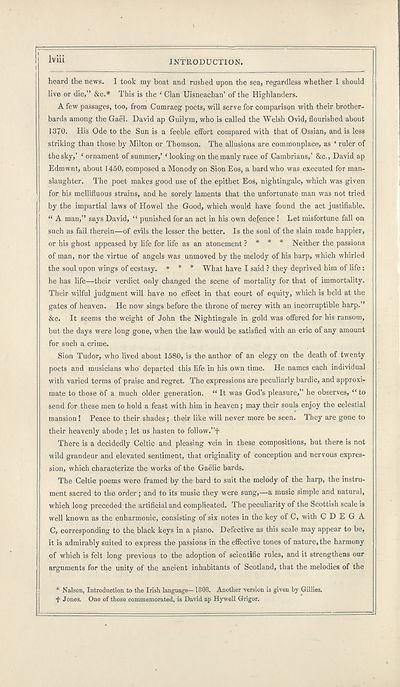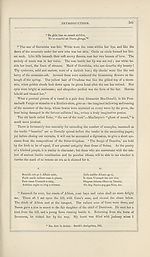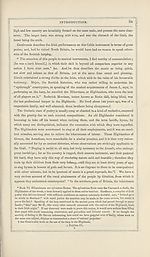Books and other items printed in Gaelic from 1871 to 1900 > Sar-obair nam bard gaelach, or, The beauties of Gaelic poetry, and lives of the Highland bards
(72) Page lviii
Download files
Complete book:
Individual page:
Thumbnail gallery: Grid view | List view

INTRODUCTION.
heard the news. I took my boat and rushed upon the sea, regardless whether I should
live or die,” &c.# This is the ‘ Clan Uisneachan’ of the Highlanders.
A few passages, too, from Cumraeg poets, will serve for comparison with their brother-
bards among the Gael. David ap Guilym, who is called the Welsh Ovid, flourished about
1370. His Ode to the Sun is a feeble effort compared with that of Ossian, and is less
striking than those by Milton or Thomson. The allusions are commonplace, as ‘ ruler of
the sky,’ ‘ ornament of summer,’ ‘ looking on the manly race of Cambrians,’ &c., David ap
Edmwnt, about 1450, composed a Monody on Sion Eos, a bard who was executed for man¬
slaughter. The poet makes good use of the epithet Eos, nightingale, which was given
for his mellifluous strains, and he sorely laments that the unfortunate man was not tried
by the impartial laws of Howel the Good, which would have found the act justifiable.
“ A man,” says David, “ punished for an act in his own defence ! Let misfortune fall on
such as fail therein—of evils the lesser the better. Is the soul of the slain made happier,
or his ghost appeased by life for life as an atonement ? * * * Neither the passions
of man, nor the virtue of angels was unmoved by the melody of his harp, which whirled
the soul upon wings of ecstasy. * * * What have I said ? they deprived him of life :
he has life—their verdict only changed the scene of mortality for that of immortality.
Their wilful judgment will have no effect in that court of equity, which is held at the
gates of heaven. He now sings before the throne of mercy with an incorruptible harp.”
&c. It seems the weight of John the Nightingale in gold was offered for his ransom,
but the days were long gone, when the law would be satisfied with an eric of any amount
for such a crime.
Sion Tudor, who lived about 1580, is the author of an elegy on the death of twenty
poets and musicians who departed this life in his own time. He names each individual
with varied terms of praise and regret. The expressions are peculiarly bardic, and approxi¬
mate to those of a much older generation. “ It was God’s pleasure,” he observes, “to
send for these men to hold a feast with him in heaven; may their souls enjoy the celestial
mansion ! Peace to their shades; their like will never more be seen. They are gone to
their heavenly abode : let us hasten to follow.”+
There is a decidedly Celtic and pleasing vein in these compositions, but there is not
wild grandeur and elevated sentiment, that originality of conception and nervous expres¬
sion, which characterize the works of the Gaelic bards.
The Celtic poems were framed by the bard to suit the melody of the harp, the instru¬
ment sacred to the order; and to its music they were sung,—a music simple and natural,
which long preceded the artificial and complicated. The peculiarity of the Scottish scale is
well known as the enharmonic, consisting of six notes in the key of C, with C D E G A
C, corresponding to the black keys in a piano. Defective as this scale may appear to be,
it is admirably suited to express the passions in the effective tones of nature, the harmony
of which is felt long previous to the adoption of scientific rules, and it strengthens our
arguments for the unity of the ancient inhabitants of Scotland, that the melodies of the
* Nalson, Introduction to the Irish language—1808. Another version is given by Gillies.
•)- Jones. One of those commemorated, is David ap Hywell Grigor.
heard the news. I took my boat and rushed upon the sea, regardless whether I should
live or die,” &c.# This is the ‘ Clan Uisneachan’ of the Highlanders.
A few passages, too, from Cumraeg poets, will serve for comparison with their brother-
bards among the Gael. David ap Guilym, who is called the Welsh Ovid, flourished about
1370. His Ode to the Sun is a feeble effort compared with that of Ossian, and is less
striking than those by Milton or Thomson. The allusions are commonplace, as ‘ ruler of
the sky,’ ‘ ornament of summer,’ ‘ looking on the manly race of Cambrians,’ &c., David ap
Edmwnt, about 1450, composed a Monody on Sion Eos, a bard who was executed for man¬
slaughter. The poet makes good use of the epithet Eos, nightingale, which was given
for his mellifluous strains, and he sorely laments that the unfortunate man was not tried
by the impartial laws of Howel the Good, which would have found the act justifiable.
“ A man,” says David, “ punished for an act in his own defence ! Let misfortune fall on
such as fail therein—of evils the lesser the better. Is the soul of the slain made happier,
or his ghost appeased by life for life as an atonement ? * * * Neither the passions
of man, nor the virtue of angels was unmoved by the melody of his harp, which whirled
the soul upon wings of ecstasy. * * * What have I said ? they deprived him of life :
he has life—their verdict only changed the scene of mortality for that of immortality.
Their wilful judgment will have no effect in that court of equity, which is held at the
gates of heaven. He now sings before the throne of mercy with an incorruptible harp.”
&c. It seems the weight of John the Nightingale in gold was offered for his ransom,
but the days were long gone, when the law would be satisfied with an eric of any amount
for such a crime.
Sion Tudor, who lived about 1580, is the author of an elegy on the death of twenty
poets and musicians who departed this life in his own time. He names each individual
with varied terms of praise and regret. The expressions are peculiarly bardic, and approxi¬
mate to those of a much older generation. “ It was God’s pleasure,” he observes, “to
send for these men to hold a feast with him in heaven; may their souls enjoy the celestial
mansion ! Peace to their shades; their like will never more be seen. They are gone to
their heavenly abode : let us hasten to follow.”+
There is a decidedly Celtic and pleasing vein in these compositions, but there is not
wild grandeur and elevated sentiment, that originality of conception and nervous expres¬
sion, which characterize the works of the Gaelic bards.
The Celtic poems were framed by the bard to suit the melody of the harp, the instru¬
ment sacred to the order; and to its music they were sung,—a music simple and natural,
which long preceded the artificial and complicated. The peculiarity of the Scottish scale is
well known as the enharmonic, consisting of six notes in the key of C, with C D E G A
C, corresponding to the black keys in a piano. Defective as this scale may appear to be,
it is admirably suited to express the passions in the effective tones of nature, the harmony
of which is felt long previous to the adoption of scientific rules, and it strengthens our
arguments for the unity of the ancient inhabitants of Scotland, that the melodies of the
* Nalson, Introduction to the Irish language—1808. Another version is given by Gillies.
•)- Jones. One of those commemorated, is David ap Hywell Grigor.
Set display mode to:
![]() Universal Viewer |
Universal Viewer | ![]() Mirador |
Large image | Transcription
Mirador |
Large image | Transcription
Images and transcriptions on this page, including medium image downloads, may be used under the Creative Commons Attribution 4.0 International Licence unless otherwise stated. ![]()
| Permanent URL | https://digital.nls.uk/107579510 |
|---|
| Description | Out-of-copyright books printed in Gaelic between 1631 and 1900. Also some pamphlets and chapbooks. Includes poetry and songs, religious books such as catechisms and hymns, and different editions of the Bible and the Psalms. Also includes the second book ever published in Gaelic in 1631. |
|---|

